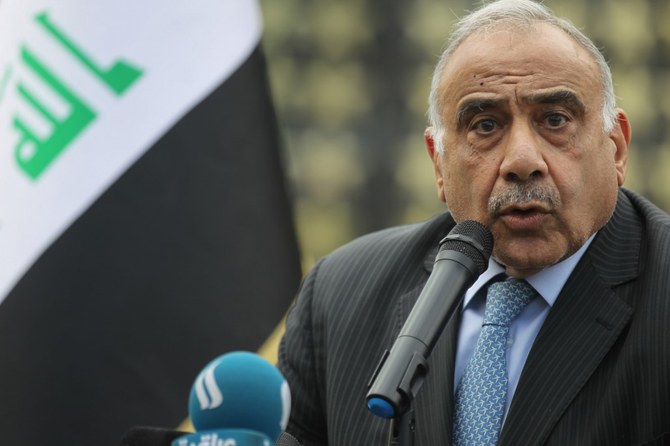
- ARAB NEWS
- 25 Apr 2024

At an emergency session on Sunday, the Iraqi Parliament accepted the resignation of Prime Minister Adel Abdul Mahdi. The PM offered to resign within hours of a public rebuke from Grand Ayatollah Ali Al-Sistani, who castigated the government for its “clear failure” in dealing with the public agitations that have overwhelmed the country since late October. Al-Sistani was responding to the killing of about 60 demonstrators in the towns of Nasiriya and Basra on Nov. 28 and the torching of the Iranian consulate in Najaf.
The government resorted to considerable firepower to quell the initial agitations, which caused the demonstrations to spread to Baghdad and major towns across southern Iraq. One demonstrator described the triggers of these agitations as “hunger, humiliation and abuse, and finally the mass killings.”
This pattern of popular anger and governmental violence through October and November has caused the deaths of 400 people and injuries to several thousand. The commentator Harith Hasan has called these demonstrations “the largest grassroots movement in Iraq’s modern history.”
Government leaders have regularly offered sops to reduce popular anger. On Nov. 1, President Barham Salih accepted the urgent need for reform and called for a national dialogue. Abdul Mahdi then offered a 17-point plan promising employment and improved services. Later, on Nov. 18, as the death toll mounted, the parliamentary blocs agreed on wide-ranging reforms — a new electoral law, a Cabinet reshuffle, and a special court to handle corruption cases.
But, with these politicians enjoying little credibility, their pronouncements had no impact: The demand from the street was for radical political change in which these leaders have no role.
In a country where 25 percent of young people are unemployed, the first demand has been for employment and improved economic conditions. But, unlike earlier occasions, this time the critique from the street has expanded exponentially to embrace the entire governance order — defined by endemic corruption in an institutionalized spoils system that distributes state largesse among politicians enjoying position and power in an ethno-sectarian quota system.
The street has so far remained unimpressed by Abdul Mahdi’s departure and insists on major changes in the electoral law.
Talmiz Ahmad
Thus, the demonstrators demand tough judicial action against corruption, an end to the sectarian order and the introduction of direct, constituency-based elections in place of the present “list” system, where votes go to parties rather than specific candidates.
The agitations have largely taken place in Iraq’s Shiite areas and have involved significant anti-Iran rhetoric, including the targeting of the Iranian consulates at Karbala and Najaf. The demonstrators have come to view Iran as the principal support base of the existing system, principally through its influence on shaping governments, influencing official appointments, and undermining state authority through militias that owe their primary loyalty to Tehran.
The demonstrators believe that, during the ongoing demonstrations, these pro-Iran militias have been used to brutally suppress the popular will. Iraq is awash with news that Quds Force head Qassem Soleimani and, recently, even Supreme Leader Ali Khamenei have advocated a tough stand against the demonstrators, which has caused the high death toll.
The Iranians have freely blamed the agitations on conspiracies hatched by a variety of external players — the US, Israel and the Gulf states, and even Daesh and the Ba’ath Party. But they have carried little conviction, as the call from the street is for an Iraqi leadership that is truly sovereign and free from foreign influence.
The resignation of Abdul Mahdi has caused confusion: Nobody seems to know what will happen next, since the rules relating to the next steps are convoluted. They require that the president heads a caretaker government until Parliament selects a new prime minister or, failing this, new elections are held. This will take several weeks and will test the patience of the agitators on the street.
This will also throw up several complex constitutional issues. The street has so far remained unimpressed by Abdul Mahdi’s departure and insists on major changes in the electoral law. This, in their view, should include constituency-based direct elections under UN supervision, after which the new Parliament would effect wide-ranging constitutional changes to end sectarian-based quotas and the corruption inherent in the existing order. Some even want a presidential system to replace the existing parliamentary system.
Both these changes face formidable challenges. The existing parties — Shiite and Sunni alike — flourish in the existing order and are likely to oppose radical change. And the Shiite groups want a presidential system, while the Sunnis want the present order to continue. The Kurds wish to retain the unique benefits they enjoy in the present dispensation relating to their autonomy and want no change whatsoever.
And then there are the external players — the US and Iran. Some observers believe that the US has little interest in Iraq. Vice President Mike Pence visited on Nov. 23, but he landed in the Kurdish capital Irbil rather than Baghdad. Meanwhile, Iran, with its deep interests in Iraq and its formidable assets, is not likely to pack up and go away.
For Iraq, the forthcoming winter will be cold, miserable and perhaps even murderous.
Talmiz Ahmad is an author and former Indian ambassador to Saudi Arabia, Oman and the UAE. He holds the Ram Sathe Chair for International Studies, Symbiosis International University, Pune, India.